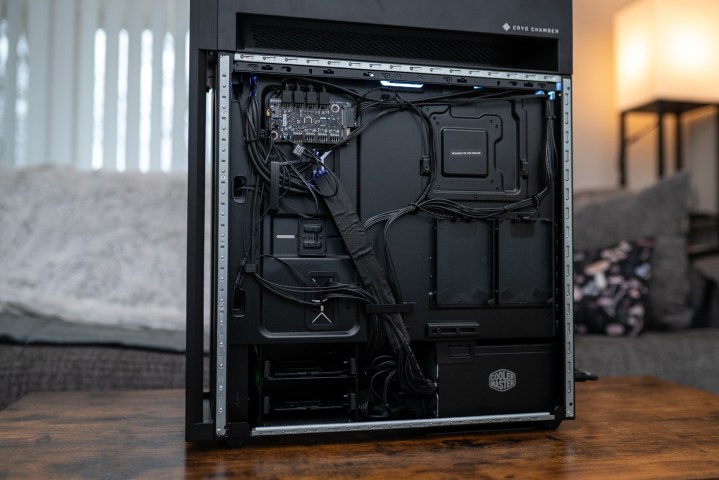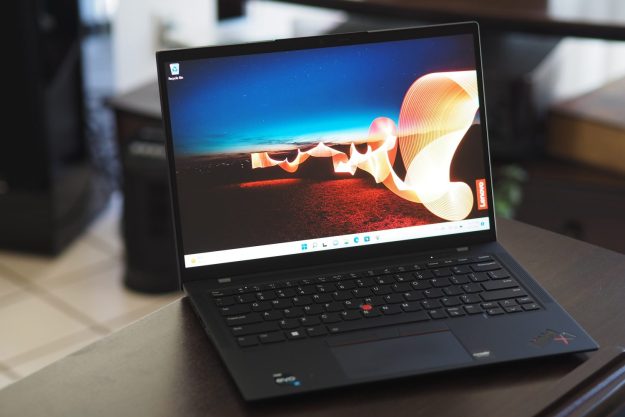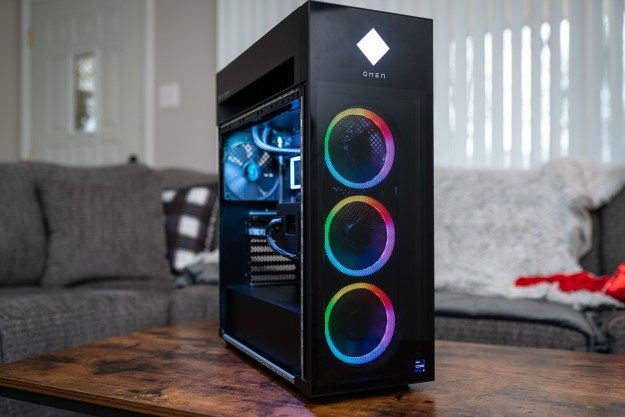
“The HP Omen 45L is the result when a manufacturer delivers on every promise it makes.”
- Excellent CPU cooling solution
- Tool-less design
- Upgradable with off-the-shelf parts
- Great gaming performance
- Doesn't get too loud
- Extra hard drive bays
- Limited number of USB ports
- No DDR5 option
- Bloatware is a little annoying
The HP Omen 30L sits at the top of our best gaming desktop list. It’s not tied or barely hanging on to a spot — it’s the best option if you’re looking for a prebuilt gaming desktop. The Omen 45L, announced at CES 2022, aims to make the best better. And across the board, it succeeds.
No gaming desktop is perfect, especially the prebuilt ones, but the Omen 45L improves on its predecessor in almost every way. It has a unique cooling design that actually pays off in thermals; the tool-less case is even easier to get inside; and the performance, although occasionally hamstrung by memory speed, is worthy of the hardware inside.
The HP Omen 30L is no longer the best gaming desktop on the market. HP has outclassed itself, and even considering the minor issues with the Omen 45L, it’s the gaming PC you should buy if you don’t want to — or more likely, can’t — build a gaming rig right now.
Design
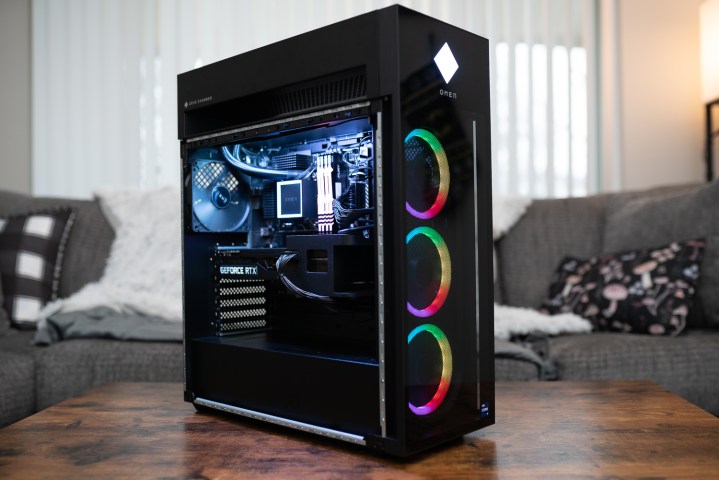
The HP Omen 45L doesn’t look like a normal gaming PC. It’s taller than a standard mid-tower thanks to the Cryo Chamber on top, but the PC doesn’t feel much bigger once it’s all set up. It’s only 18 inches long and 21.75 inches tall, which is only a couple of inches taller than a mid-tower PC case.
Over last year’s Omen 30L, the biggest change with the Omen 45L is the Cryo Chamber. It looks silly at first, but I grew to appreciate the small gap thanks to its thermal performance. The top chamber holds the 240mm all-in-one (AIO) liquid cooler, only connected to the main machine through a thin routing channel where the tubes run.
This fixes the biggest issue with the Omen 30L. It’s a similar idea as the fanless, breathing PC we saw from DIY Perks earlier this year. Regardless of the orientation of the AIO, it’s always drawing in cold air and exhausting hot air away from the other components.
That made a big difference in my testing. During a 30-minute AIDA64 stress test, the CPU immediately climbed to 89 degrees Celsius and the fans ramped up to max speed. Much to my surprise, the fans calmed down after about a minute and the CPU nestled into a comfortable 65 degrees Celsius. There weren’t ramps up and down in between, either — the Omen 45L rode out that temperature for the rest of the test without even a whisper of extra fan noise.
HP is selling the Omen 45L case alone, and honestly, I might pick one up.
It’s a massive improvement over the Omen 30L, where we saw the Core i9-10900K reach temperatures nearing 97 degrees Celsius and fan noise that was “scary loud.” The Omen 45L was almost silent when playing games, and when the fans ramped up, they didn’t become too distracting. HP is actually selling the Omen 45L case alone, and honestly, I might pick one up.
Outside of thermal and noise improvements, the Omen 45L keeps the same design language as the Omen 30L. It’s still a sleek black case with a bright Omen diamond on top. The main difference is the inclusion of three 120mm ARGB fans, which shine through the tinted tempered glass on the front.
The design is similar, but HP made a lot of changes to the case. The front intakes are now completely open to allow more air through, and the dust filters (one in the front and one under the power supply) are now removable. HP also improved the tool-less entry, which I’ll talk more about in the next section.
This is the type of iterative improvement I like to see. HP didn’t ditch what made the Omen 30L look great. Instead, the company built on that design by making smart thermal and quality of life changes that pay dividends. We always hear about improved thermal designs with new gaming desktops. But HP actually delivered on that promise in a big way.
Specs and internals
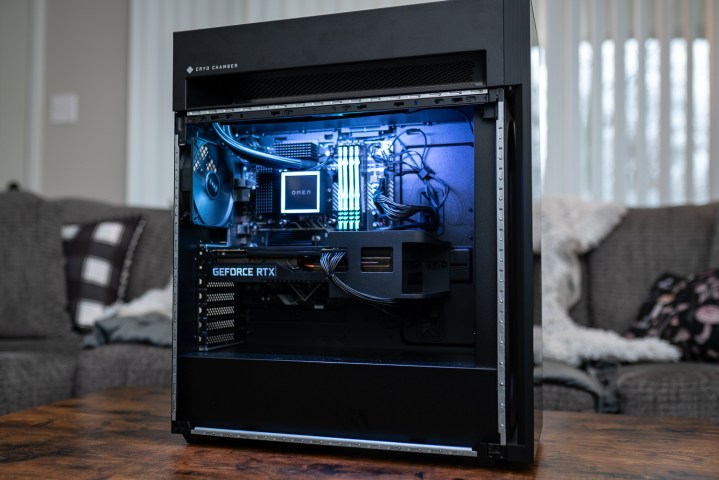
The Omen 45L comes with the best hardware you can buy right now. At the heart of my test system was the Core i9-12900K paired with an RTX 3090 and 64GB of DDR4-3733 memory. HP isn’t offering this as a set configuration, though you can build an exact match with HP’s customization options for around $5,000.
HP has much cheaper options, too. With a Ryzen 7 5800X, RTX 3070, and 16GB of memory, you’ll pay around $2,300. You have the freedom to build the PC you want, though. HP is offering the Omen 45L with either an Intel or AMD chip, as well as either an Nvidia or AMD graphics card. AMD cards are limited to the Radeon RX 6700 XT, but otherwise, HP has all of the most recent flagship hardware on offer.
| CPU | Intel Core i9-12900K |
| GPU | Nvidia GeForce RTX 3090 |
| Motherboard | HP 8917 Micro ATX Z690 |
| Case | HP Omen 45L ATX case |
| Memory | 64GB HyperX DDR4-3733 |
| Storage | 2x 2TB WD_Black PCIe Gen4 |
| Power supply | Cooler Master 800W 80 Plus Gold |
| USB ports | 4x USB 3.2, 4x USB 2.0, 2x USB-C |
| Networking | 1x Gigabit Ethernet |
As with the Omen 30L, there’s nothing proprietary inside the Omen 45L. The graphics card and motherboard are made by HP, but you could always swap them out or put them in another machine. That’s a big plus over machines like the Alienware Aurora that uses its own motherboard design.
HP says it wants the Omen 45L to feel like a DIY PC, and it does.
More than the standardized components, I appreciated how HP flexed its suite of brands to bring branded components to the Omen 45L. You get HyperX memory, not no-name modules that could’ve been sourced from anywhere, and you get a Cooler Master power supply and cooler, not components that come with obscure companies that deal specifically with manufacturers. HP says it wants the Omen 45L to feel like a DIY PC, and it does.
There are some problems, though. HP chose a Micro ATX motherboard instead of a full-size ATX one. The case supports an ATX board, but you can’t buy one from HP. This is a machine that can come with the best hardware on the market, and it deserves a full ATX board like the Asus ROG GA35 offers.
It also only comes with DDR4 memory. Even if you choose a 12th-gen Alder Lake CPU, you can’t add DDR5 unless you buy a separate motherboard and memory on your own. DDR5 is obscenely expensive right now, so I understand why HP chose to stick with DDR4. Still, that has an impact on performance, which I’ll dig into in my benchmarks below.
Upgradeability

Like the Omen 30L, the Omen 45L has a tool-less design. Outside of the screws for your motherboard and cooler, you don’t need anything to get inside the case and move parts around. There are two buttons under the Cryo Chamber for the side panels, as well as two buttons toward the front to snap off the front panel.
Even without instruction, I was inside the Omen 45L in seconds. Beyond being tool-less, the design is intuitive. There’s never a question about which button you need to press thanks to clear labeling, and the tool-less mechanisms are of a high enough quality that you don’t feel like you’re going to break something. Prebuilt or not, this is how you should design a PC case.
HP tidied up the cables over the Omen 30L. There’s still a bit of a mess behind the back panel, but the cables are hidden, and it’s clear there was some effort to clean up the cable runs. HP even includes some extra SATA power and data cables dangling in the bottom of the machine if you want to occupy the two 3.5-inch and two 2.5-inch drive cages around the back.
The Omen 45L is a treat. Not only does it allow upgrades unlike its Alienware counterparts, it invites them. I’m partial to my Lian Li PC-011 Dynamic, but after using the Omen 45L, I’m seriously considering picking up the case on its own. It’s that good.
Connectivity

The weakest aspect of the Omen 45L is connectivity. The Micro ATX motherboard is limited to the same number of ports as the Omen 30L, which stands out even more on this larger design. You should still have enough ports for everything, but you’ll need to break out a USB hub if you have a lot of dongles or USB accessories.
Over the Omen 30L, the new model adds two additional USB ports up front. The problem is that the new ports are locked at USB 2.0. I’ll never argue with more USB ports in front of a PC, but this doesn’t feel like much an addition. Where are the front panel USB-C ports? At the very least, HP could’ve added two more USB 3.2 ports to the front.

The same is true around back. Just like the Omen 30L, you have two USB 3.2 ports (5Gbps and 10Gbps), two USB 2.0 ports, and two USB-C ports (5Gbps and 10Gbps). I like the inclusion of two USB-C ports, but I really wish one was on the front panel. The single upgrade in connectivity is inconsequential, and it feels like HP could’ve done a lot more here.
Gaming performance
The HP Omen 45L is a gaming monster, and thankfully, the unfortunate state of DDR5 doesn’t have a massive impact on gaming performance. The model I reviewed came kitted out with a Core i9-12900K, 64GB of DDR4-3733 memory, and an RTX 3090. Although I ran benchmarks from 1080p to 4K, the results below are for 4K at the highest graphics preset.
| HP Omen 45L | Origin Neuron (Ryzen 9 5950X, RTX 3080 Ti) | Custom PC (Core i9-12900K, RTX 3090, DDR5) | |
| Forza Horizon 4 | 159 fps | 146 fps | 160 fps |
| Red Dead Redemption 2 | 76 fps | 72 fps | 79 fps |
| Battlefield V | 121 fps | N/A | N/A |
| 3DMark Time Spy | 18,523 | 17,937 | 19,511 |
| Fortnite | 82 fps | 89 fps | N/A |
| Control non-RT | 59 fps | 55 fps | N/A |
| Control RT | 37 fps | 35 fps | N/A |
| Civilization VI (turn time in seconds, lower is better) | 7.44 | N/A | 7.3 |
The RTX 3090 may be overkill for gaming, but it still rips games to shreds. Compared to the Origin Neuron with an RTX 3080 Ti, I saw improvements in Forza Horizon 4, Red Dead Redemption 2, and Control. Fortnite was the only oddball, with my results from the Omen 45L sitting about 8% lower than the Origin Neuron.
Outside of the graphics card, the Core i9-12900K shows its power in the Omen 45L. My custom built PC has identical specs. The only difference is that it uses DDR5 memory instead of DDR4. You can see that having an impact in 3DMark Time Spy, with the Omen 45L sitting around 5% lower than my custom rig.
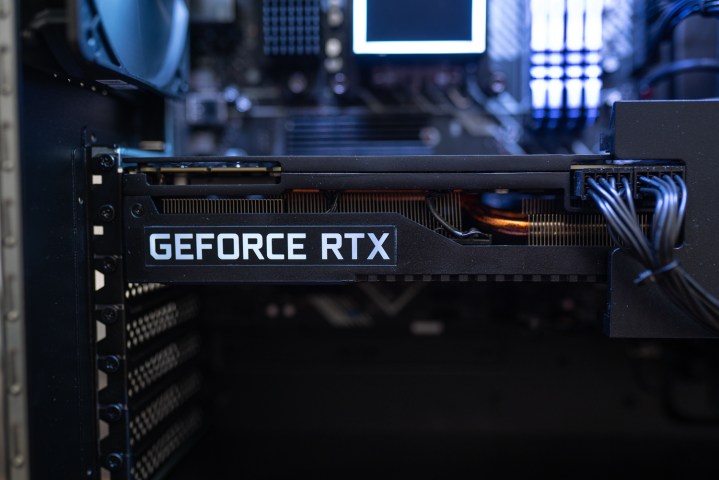
The differences are minor otherwise. The difference of a few frames in Forza Horizon 4 and Red Dead Redemption 2 aren’t large enough to matter. For gaming at least, the Omen 45L offers comparable performance to building the same PC yourself — and that’s really what you want for a prebuilt gaming desktop.
DDR4 makes a difference, but it doesn’t matter in a lot of games. I tested an identical custom PC with DDR4 in 3DMark Time Spy and came out with a very similar score as the Omen 45L, showing that this benchmark cares about memory speed. A lot of games don’t, as showcased by Forza Horizon 4 and Red Dead Redemption 2.
The memory speed makes a much bigger difference in productivity apps, which is where the Omen 45L falls behind.
Productivity performance

The Omen 45L is handicapped by DDR4. It has the fastest processor and graphics card on the market, and the results should reflect that. But they don’t. The slower memory holds the Omen 45L back from reaching its full potential, putting it on par with hardware that should, on paper, be less performant.
| HP Omen 45L | Origin Neuron (Ryzen 9 5950X, RTX 3080 Ti) | Custom PC (Core i9-12900K, RTX 3090, DDR5) | |
| Cinebench R23 multi-core | 23,068 | 25,166 | 27,344 |
| Cinebench R23 single-core | 1,893 | 1,587 | 1,989 |
| Geekbench 5 multi-core | 15,685 | 15,872 | 18,282 |
| Geekbench 5 single-core | 1,910 | 1,682 | 1,962 |
| PugetBench for Premiere Pro | 1,025 | 1,088 | 1,283 |
| Blender (Average in seconds, lower is better) | 51 | 53 | N/A |
| Handbrake (Seconds, lower is better) | 51 | 50 | 47 |
| PCMark 10 | 9,034 | N/A | 9,092 |
Cinebench shows the most stark difference. Although the Omen 45L still allows the single-core performance of the Core i9-12900K to shine through, the multi-core performance is about 16% behind what’s possible with DDR5. The same is true in PugetBench for Premiere Pro, where the Omen 45L trailed my custom PC by about 20%.
The Origin Neuron illustrates this point further. In Geekbench 5, for example, the Omen 45L matched the Origin Neuron in the multi-core test, but it should perform about 15% better. The single-core performance continues to show, but DDR4 is clearly a bottleneck for the Omen 45L.
It’s not a bottleneck across applications, though. My results in Handbrake, Blender, and PCMark 10 show only minor differences between the three machines. DDR5 makes a big difference with Alder Lake, but that difference isn’t consistent across apps.
HP isn’t offering the Omen 45L with DDR5, but there’s a good reason why. DDR5 is expensive and in high demand, which would either delay the Omen 45L or drive up the price.
It makes sense, but the logistical machinations at HP don’t matter when $5,000 is on the line. Machines like the Origin Neuron are available with DDR5, even if it’s a premium. This is HP’s most performant desktop, and a couple of hundred dollars for DDR5 is insignificant considering the price set by HP.
Software

The Omen 45L comes with HP Omen Gaming Hub, which is a lot more robust than I expected. True of other HP machines, though, it also came pre-installed with annoying bloatware, which interrupted my benchmarking with ads a number of times during testing.
It comes pre-loaded with ExpressVPN, Dropbox, and McAfee. I only saw ads for ExpressVPN and Dropbox once each, but McAfee popped up too many times to count. These are apps you may want to use, but I still don’t appreciate a $5,000 gaming PC coming preloaded with advertisements.
The Omen Gaming Hub makes up for that. Starting with the basics, the app allows you to monitor usage, active processes, temperatures, and basically all of the other vitals of your PC. It also includes integration with Intel XTU for overclocking, as well as lighting controls and a network monitor.
I appreciate having so much functionality in one spot with Gaming Hub.
Outside of the basics, the Gaming Hub serves as, well, a hub for your games. You can see and launch your installed titles, track play time, save screenshots, and even earn rewards for playing select titles (including free games). If you fancy MOBAs, you can use Mobalytics to see stats about your gameplay, too.
The Omen Gaming Hub isn’t essential, and in spots, it’s a little rough around the edges. But I still appreciate having so much functionality in one spot. These types of apps are usually nothing more than support hubs littered with advertisements. The Omen Gaming Hub is still a support hub and it still has ads, but that’s easy to overlook with how much else it offers.
Our take
The Omen 45L takes an already great design and improves it. This could have just been a larger Omen desktop with space for more fans, but it’s not. HP brought tangible improvements to thermals and cable management, as well as built on the fantastic tool-less design introduced in the Omen 30L.
There are some issues — I would have liked more connectivity, and DDR4 can cripple the CPU in some applications. Still, it’s hard to stick on those points with how much else the Omen 45L offers. It’s a great performer overall, and the tool-less design makes upgrades easy down the line.
Are there any alternatives?
Yes. The Origin Neuron and Asus GA35 are the most direct competitors, but neither come with the unique cooling design HP is offering. The case, at least, is unique to HP.
How long will it last?
HP says the Omen 45L should feel like a DIY PC. The PC uses off-the-shelf parts, so you can upgrade it as long as you want. HP is even selling the case alone, so you could use it indefinitely as long as you continue to upgrade the parts inside.
As configured, you can expect the machine to hold up in demanding games and productivity apps for around five years. Make a CPU or GPU swap, though, and you can exponentially increase that lifespan.
Should you buy it?
Yes. In the crowded market of gaming desktops, the HP Omen 45L stands out as one of the best desktop PCs with its tool-less design, excellent cooling solution, and dedication to upgradability. Outside of DDR4 and a slight lack of ports, it’s the perfect gaming desktop.
Editors' Recommendations
- No, The Last of Us PC requirements aren’t changing
- Meta Quest Pro vs. Quest 2: a clear choice for VR gaming
- The best HP laptops
- The best desktop computers for 2023: Dell, HP, Apple, and more
- The best tablets in 2023: top 9 picks you should buy





